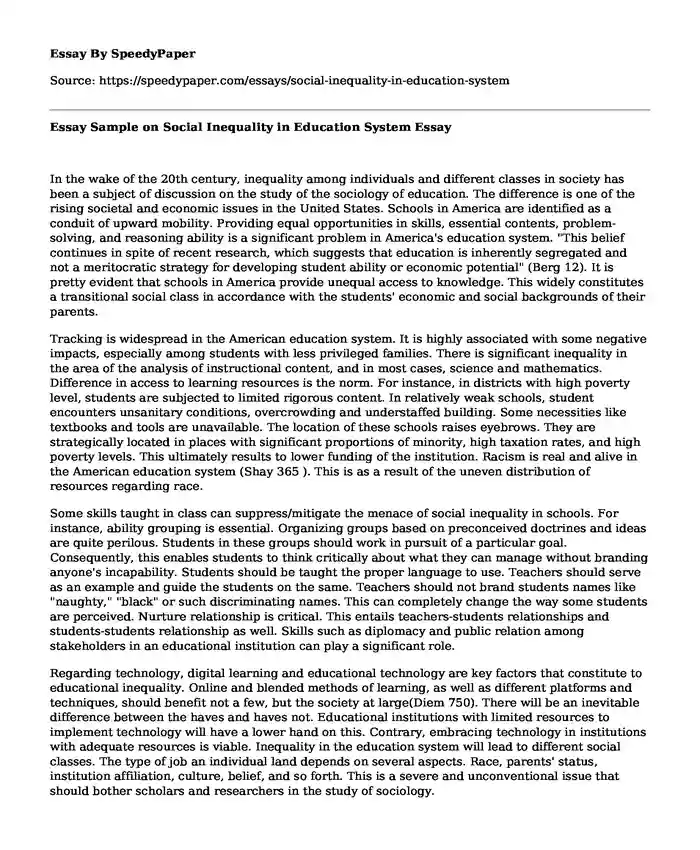
| Type of paper: | Essay |
| Categories: | Education Discrimination School Social issue |
| Pages: | 3 |
| Wordcount: | 684 words |
In the wake of the 20th century, inequality among individuals and different classes in society has been a subject of discussion on the study of the sociology of education. The difference is one of the rising societal and economic issues in the United States. Schools in America are identified as a conduit of upward mobility. Providing equal opportunities in skills, essential contents, problem-solving, and reasoning ability is a significant problem in America's education system. "This belief continues in spite of recent research, which suggests that education is inherently segregated and not a meritocratic strategy for developing student ability or economic potential" (Berg 12). It is pretty evident that schools in America provide unequal access to knowledge. This widely constitutes a transitional social class in accordance with the students' economic and social backgrounds of their parents.
Tracking is widespread in the American education system. It is highly associated with some negative impacts, especially among students with less privileged families. There is significant inequality in the area of the analysis of instructional content, and in most cases, science and mathematics. Difference in access to learning resources is the norm. For instance, in districts with high poverty level, students are subjected to limited rigorous content. In relatively weak schools, student encounters unsanitary conditions, overcrowding and understaffed building. Some necessities like textbooks and tools are unavailable. The location of these schools raises eyebrows. They are strategically located in places with significant proportions of minority, high taxation rates, and high poverty levels. This ultimately results to lower funding of the institution. Racism is real and alive in the American education system (Shay 365 ). This is as a result of the uneven distribution of resources regarding race.
Some skills taught in class can suppress/mitigate the menace of social inequality in schools. For instance, ability grouping is essential. Organizing groups based on preconceived doctrines and ideas are quite perilous. Students in these groups should work in pursuit of a particular goal. Consequently, this enables students to think critically about what they can manage without branding anyone's incapability. Students should be taught the proper language to use. Teachers should serve as an example and guide the students on the same. Teachers should not brand students names like "naughty," "black" or such discriminating names. This can completely change the way some students are perceived. Nurture relationship is critical. This entails teachers-students relationships and students-students relationship as well. Skills such as diplomacy and public relation among stakeholders in an educational institution can play a significant role.
Regarding technology, digital learning and educational technology are key factors that constitute to educational inequality. Online and blended methods of learning, as well as different platforms and techniques, should benefit not a few, but the society at large(Diem 750). There will be an inevitable difference between the haves and haves not. Educational institutions with limited resources to implement technology will have a lower hand on this. Contrary, embracing technology in institutions with adequate resources is viable. Inequality in the education system will lead to different social classes. The type of job an individual land depends on several aspects. Race, parents' status, institution affiliation, culture, belief, and so forth. This is a severe and unconventional issue that should bother scholars and researchers in the study of sociology.
Conflict theorists hardly believe public schools can be a solution to social inequality. They instead hold that the educational system perpetuates social inequalities that originate from race, gender, and ethnicity, among others. An Individual's education fulfillment is affiliated with a particular social class. The opportunity awarded to students of low social-economic widely differs from the options given to students of higher status. Education tracking refers to the allocation of students into different educational niches according to precisely defined criteria. Some of these criteria include ability, interest, and achievement.
Works Cited
Berg, Gary A. Low-income students and the perpetuation of inequality: Higher education in America. Routledge, 2016.
Diem, Sarah, et al. "Racial diversity in the suburbs: how race-neutral responses to demographic change perpetuate inequity in suburban school districts." Race, Ethnicity, and Education19.4 (2016): 731-762.
Shay, Suellen, and Tai Peseta. "A socially just curriculum reform agenda." (2016): 361-366.
Cite this page
Essay Sample on Social Inequality in Education System. (2023, Jan 29). Retrieved from https://speedypaper.net/essays/social-inequality-in-education-system
Request Removal
If you are the original author of this essay and no longer wish to have it published on the SpeedyPaper website, please click below to request its removal:
- Hazardous Material Management and Hazard Communication - Essay Example
- Spreadsheets Are Vulnerable to Fraud, Free Essay Sample
- Free Essay in History of Religion with Articles Review
- The Basics of the U.S. Economy, Free Essay in Economics
- Hospital Assessment Essay Example
- Free Essay Example: Journey to Sustainability
- "Jazz with Bob Perkins," Jazz standards WRTI 90.1 FM. Free Essay
Popular categories




